This panel focused on the challenges of ensuring persons with disabilities are protected and their rights upheld during crises and emergency situations. It looked at humanitarian crises, preparing for and mitigating disasters, the effects of wars and health and other emergencies. Panellists underlined how persons with disabilities must be involved in this work.
Gunta Anca, Vice-President of the European Disability Forum and MEP Katrin Langesiepen moderated the panel. Panellists included Janez Lenarčič, European Commissioner for Crisis Management; Valerii Sushkevych, Head of the National Assembly of Persons with Disabilities (NAPD), Ukraine; Paola Albrito, Director of the United Nations Office for Disaster Risk Reduction; and Idriss Maïga Alzouma, Chairperson of the African Disability Forum (ADF) and Second Vice-President of the International Disability Alliance.
The main conclusions included:
- The importance of ensuring the accessibility of infrastructures and tools used during emergencies.
- Involving organisations of persons with disabilities in preparing and developing plans to deal with crises, disasters and other emergencies.
- The need to collect data disaggregated by disability and use that data when deploying humanitarian and development aid.
MEP Langensiepen introduced the panellists and passed the floor to Commissioner Lenarčič.
Commissioner Lenarčič spoke about the importance of inclusion and accessibility in delivering humanitarian aid. He added that the EU is making efforts to ensure structures and tools used during emergency situations are disability-inclusive. He outlined progress since the last European Parliament of Persons with Disabilities, with guidance and reports using the OECD disability marker. He outlined concrete support for disability-inclusive humanitarian aid and development from the EU to third countries, including Ukraine, Somalia, and Bangladesh – 30 million euros in 2022.
He explained the EU’s efforts to provide inclusive education: “It is also crucial that every child and young person gets the education they deserve, also in emergencies”
He concluded by acknowledging that persons with disabilities are more at risk during emergency situations and more should be done to ensure they are not forgotten.
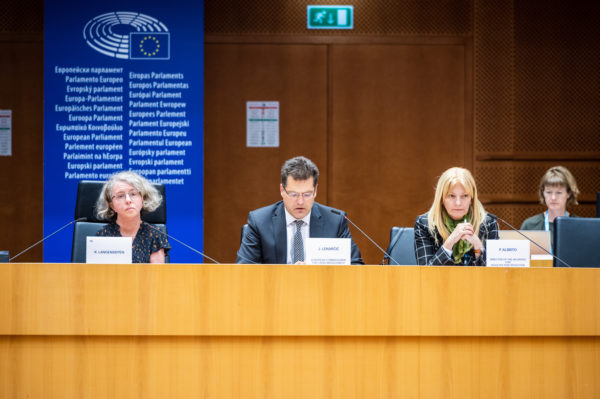
Valerii Sushkevych outlined the horrifying consequences of Russia’s war of aggression against Ukraine. He underlined that children and persons with disabilities are more at risk, and called for more support from the State and international agencies. He explained how the organisations of persons with disabilities act as “de-facto” humanitarian agencies and emergency responders while proactively advocating for disability rights. They provide immediate support, including delivering food and medication. He explained that the increase in poverty caused by the war especially affects persons with disabilities due to the lack of disability-inclusive policies in Ukraine: low disability allowances, lack of engagement with organisations of persons with disabilities, problems with evacuation and inaccessibility of bomb shelters.
Director Albrito focused on prevention and disaster risk reduction. She presented the Sendai Framework for Disaster Risk Reduction and how it acknowledges women and persons with disabilities.
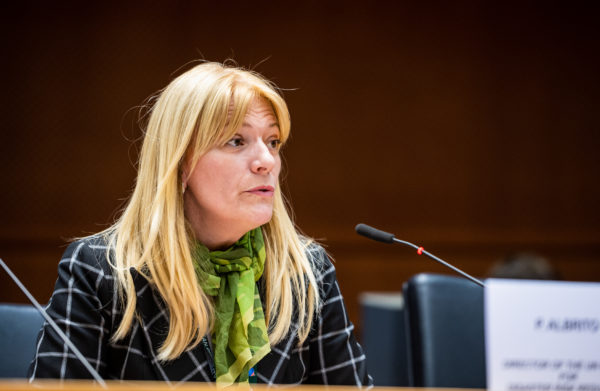
She explained how organisations of persons with disabilities, and disability advocates, are increasingly involved in developing the framework and how ensuring accessible forums has played a big part in this. The Office also created a disability scorecard to analyse how authorities are creating disability-inclusive plans. However, the involvement of the most at-risk groups is still lagging behind during day-to-day work.
She finished by sharing findings of a recently concluded survey to persons with disabilities about disability-inclusive disaster plans. It shows limited progress in disability inclusion:
- Decrease in the availability of personal preparedness plans;
- Early warning times still leave 17% of respondents with significant difficulty to evacuate;
- 6% are unable to evacuate independently ;
- Over 50% of respondents are not aware of disaster-risk reduction information;
- There is no increase in the participation of persons with disabilities in developing disaster-risk reduction plans.
- A positive sign with the creation of leadership roles to support persons with disabilities in disaster risk management, however, postholders do not have sufficient expertise.
She concluded with recommendations:
- Proper engagement of persons with disabilities and financial support to do so;
- Disaster-risk reduction provisions must comply with the UN Convention on the Rights of Persons with Disabilities.
- Use of disability-disaggregated data;
We want to continue working with you (the participants).
We believe in with all of us, nothing without us.
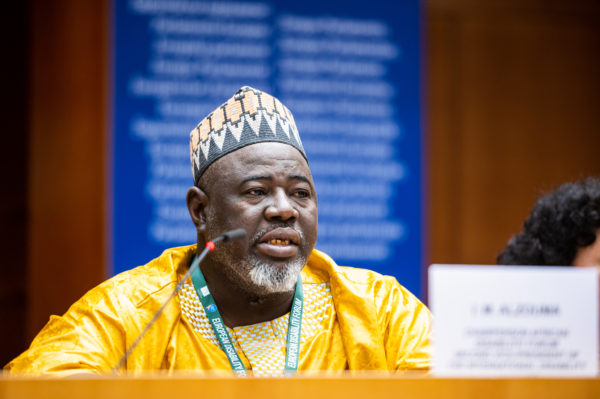
Idriss Maïga Alzouma shared the challenges facing his organisation and people living in Africa, including several crises. He expressed his solidarity with the people in Ukraine and underlined the experience of developing resiliency. He focused on the situation of children with disabilities and denounced a charity approach to persons with disabilities during crises without involving persons with disabilities in decisions.
He concluded with a call for the EU to support persons with disabilities in Africa and cooperate with the African Union.
EDF Vice-President Gunta Anca closed the panel by underlining how crises are affecting persons with disabilities – COVID-19, the Russian war against Ukraine, and the cost of living crisis. Authorities were not able to involve persons with disabilities and protect their rights. She concluded with a call for involving persons with disabilities, experts in their lives.
Interventions from the floor
Participants made short interventions from the floor. We highlight the following interventions:
- Wolfgang Angermann, representing the European Blind Union, highlighted the impact of triage practices on persons with disabilities, especially during COVID-19. He denounced the fact that help during emergency situations often depends on private organisations and calls on public authorities to provide the necessary assistance to persons with disabilities during crises.
- Lidia Best, representing the European Federation of Hard of Hearing, underlined the need to improve rights for hearing accessibility, giving the example of shortcomings during the COVID-19 pandemic. She called on the European Institutions to lead by example and provide assistive devices and accessible processes. She concluded by calling for more involvement of persons with disabilities.
- Pietro Cirrincione, representing Autism Europe, said that persons with disabilities are often the last to get assistance during emergency situations. He outlined that ableist assumptions are a big contributor to this, and States must fight them. He called for more support for displaced persons with disabilities, especially persons impacted by the Russian war of aggression against Ukraine. He concluded by demanding that EU support for Ukraine’s reconstruction is not attributed to segregated settings.
- Janek Kapper, representing the Estonian delegation, called for involving persons with disabilities from the very start in all processes and political decisions.
- Agata Roczniak, a member of the Polish delegation, spoke about the importance of the representation of persons with disabilities in society and daily life. She called for a barrier-free, conscious society, and the importance of educating children on the issues of a diverse society.
- Stelios Theofilou, a representative of the Cyprian delegation, explained that Cyprus must reform disability policies and that the State ranks last in almost all indicators. He outlined promising developments under the new government with the support of the European Union.
- Kęstutis Vaišnora, a representative of the Lithuanian delegation, calls for national sign language interpreters provided by the European Parliament during meetings organised by them. He focused on the accessibility of the emergency number – 112 in the EU – and how all its versions must be accessible.
- MEP Francesca Peppuci spoke about the importance of inclusion and equal treatment. She underlined the importance for authorities to adopt a rights-based approach.
- MEP José Gusmão outlined the impact of COVID and other crises and the harmful impact of approaches that focus on charity rather than autonomy. He called for policies and funding that encourage desegregation and independent living.
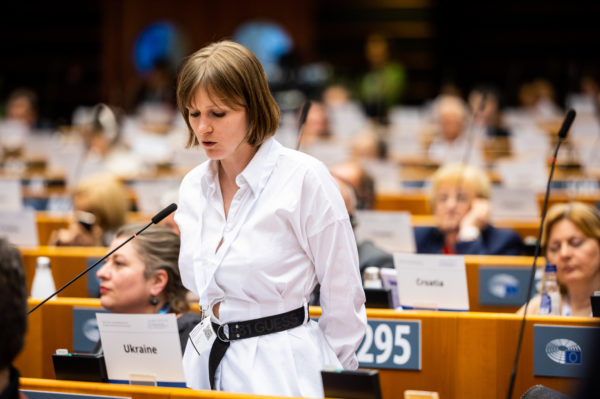
- Darya Sydorenko, representing the Ukrainian League of the Strong, powerfully talked about the negative effects of the war. She said that the war also highlighted existing shortcomings in ensuring the rights of persons with disabilities. She called for the physical renovation of infrastructures and building that ensures Universal Design; rebuild structures that allow for independent living – and not rebuild segregate settings; provide rehabilitation services in the community; and create laws to facilitate employment in the open labour market. She concluded by highlighting the need to change from the charity paradigm.
Answers from the panel
The moderators thanked the participants for their interventions.
Commissioner Lenarčič focused on the need for disability-inclusive plans for emergency situations, and that these plans need to be co-created with persons with disabilities. He added that the same goes for humanitarian aid.
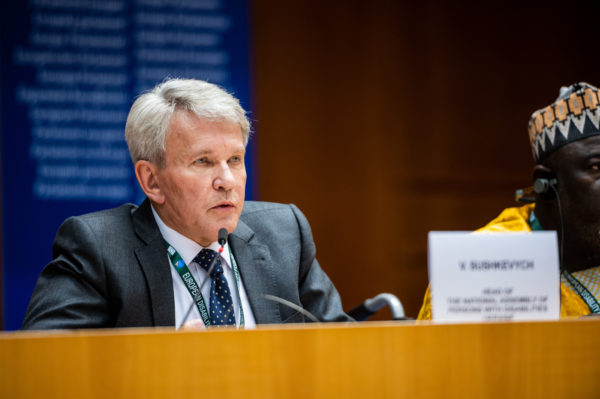
Mr Sushkevych reinforced the need to involve persons with disabilities when drafting and deploying decisions.
Director Albrito underlined that interventions show that persons with disabilities are willing to engage. She said that a challenge that is noticed by the Agency is how it often does not materialise in the creation of national strategies, and implementations of these strategies.
Mr Alzouma explained that the disability movement does not just exist to make demands but also to help States in their work by providing expertise.
MEP Langesiepen closed the panel by underlining the motto “Nothing about us without us” and that there is not a lack of knowledge but of political will.